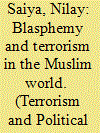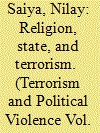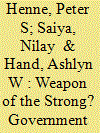| Srl | Item |
| 1 |
ID:
156917


|
|
|
|
|
| Summary/Abstract |
This article examines the effect of blasphemy laws on Islamist terrorism in Muslim-majority countries. Although passed with the ostensibly noble purpose of defending religion, I argue that blasphemy laws encourage terrorism by creating a culture of vigilantism in which terrorists, claiming to be the defenders of Islam, attack those they believe are guilty of heresy. This study empirically tests this proposition, along with alternative hypotheses, using a time-series, cross-national negative binomial analysis of 51 Muslim-majority states from 1991–2013. It finds that states that enforce blasphemy laws are indeed statistically more likely to experience Islamist terrorist attacks than countries where such laws do not exist. The statistical analysis is supplemented with a brief case study of blasphemy laws and terrorism in Pakistan. The conclusion situates the findings in the context of policy.
|
|
|
|
|
|
|
|
|
|
|
|
|
|
|
|
| 2 |
ID:
172826


|
|
|
|
|
| Summary/Abstract |
Terrorists who believe they have a role to play in bringing about the apocalypse pose a serious threat to countries around the world. In their quest to eradicate this especially pernicious form of terrorism, states, including liberal democratic ones, confront the understandable temptation to eliminate such groups through brute force: repression of apocalyptic groups and their constituencies at home and overwhelming military force abroad. Using a comparative case study of France and Japan, this article argues that such policies actually serve to perpetuate the very conditions that generate further terrorism rooted in apocalyptic beliefs. France’s policies of repression of Islam at home and militarism abroad have had the unintended consequence of encouraging attacks by those affiliated with the apocalyptic group the Islamic State of Iraq and Syria. Conversely, the case of Japan shows that successfully combating apocalyptic terrorism requires far more understated measures, including respecting religious rights at home and caution in using force abroad.
|
|
|
|
|
|
|
|
|
|
|
|
|
|
|
|
| 3 |
ID:
187716


|
|
|
|
|
| Summary/Abstract |
Many younger scholars have experience writing research articles and grant proposals but know relatively little about academic book publishing. Graduate training often provides little guidance to students regarding how to navigate the academic book-publishing process. This is unfortunate given that book publishing differs dramatically from publishing research articles. Drawing on the author’s own experiences and conversations with editors, this article provides concrete advise for first-time authors who hope to publish a scholarly book with a university press. The specific topics discussed include crafting proposals, finding appropriate presses, reaching out to editors, the peer-review process, securing and negotiating contracts, and production.
|
|
|
|
|
|
|
|
|
|
|
|
|
|
|
|
| 4 |
ID:
134804


|
|
|
|
|
| Summary/Abstract |
Given the extraordinarily competitive academic job market in the United States, this article explores a relatively new prospect for American-trained political science PhD graduates: teaching at a foreign institution. The article proceeds in two parts. First, it discusses various benefits and challenges associated with working abroad. Second, it provides practical guidance for candidates considering the international job market.
|
|
|
|
|
|
|
|
|
|
|
|
|
|
|
|
| 5 |
ID:
166659


|
|
|
|
|
| Summary/Abstract |
This article investigates two ways in which state involvement in religion—minority and majority restriction—generates terrorism. Using a time-series, cross-national negative binomial analysis of 174 countries from 1991–2009, this study finds that when religiously devout people find themselves marginalized through either form of religious restriction, they are more likely to pursue their aims through violence. The article concludes with recommendations for policymakers.
|
|
|
|
|
|
|
|
|
|
|
|
|
|
|
|
| 6 |
ID:
159594


|
|
|
| 7 |
ID:
175344


|
|
|
|
|
| Summary/Abstract |
This article addresses a puzzle in terrorism studies. That terrorism functions as a “weapon of the weak” is conventional wisdom among terrorism researchers. When it comes to religious communities, however, often it is those groups favored by the state—rather than repressed minority communities—that commit acts of terrorism. We argue that this is because official religious favoritism can empower and radicalize majority communities, leading them to commit more and more destructive terrorist attacks. We test this claim using a statistical analysis of Muslim-majority countries. Our findings support the idea that the combination of state support of religion and discrimination against minorities encourages terrorism from majority religious groups.
|
|
|
|
|
|
|
|
|
|
|
|
|
|
|
|